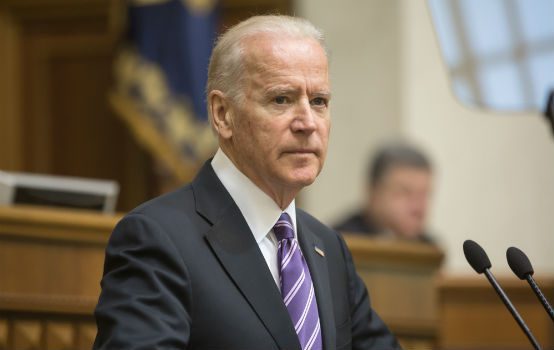Biden’s Iraq War Revisionism

Former Vice President Biden has foolishly tried to claim that he immediately turned against the Iraq war after it started:
"Immediately, that moment it started, I came out against the war at that moment," Biden told NPR about the Iraq war.
But in multiple public remarks made after the invasion began in 2003, Biden openly supported the effort. https://t.co/1d1F5obOle
— NPR Politics (@nprpolitics) September 3, 2019
As you can see, the problem with Biden’s claim is that it is clearly a false bit of revisionism on his part to minimize the damage that his vote for the 2002 AUMF is doing to his candidacy. His record shows that he repeatedly, publicly endorsed the invasion after it happened:
Months after the invasion began in 2003, Biden removed any doubt about his support for the effort, telling CNN: “I, for one, thought we should have gone in Iraq.”
At a hearing that July, he once more proclaimed his support, saying “I voted to go into Iraq, and I’d vote to do it again.”
And in a speech later than month, Biden acknowledged what “we have always known” about the war in Iraq, namely that troops “would have to stay there in large numbers for a long period of time.”
“Contrary to what some in my party might think, Iraq was a problem that had to be dealt with sooner rather than later,” he said. “So I commend the president. He was right to enforce the solemn commitments made by Saddam. If they were not enforced, what good would they be?” [bold mine-DL]
Biden’s vote to authorize the invasion of Iraq was very wrong, but it might be possible for a former war supporter to acknowledge error and explain what he learned from that terrible decision. Biden had the opportunity to say something like that in the first Democratic presidential debate earlier this year, but he blew it. The former vice president’s new claim that he turned into a war opponent overnight as soon as the war began is a self-serving lie, and it is all the more ridiculous because it is so easily exposed as false. The NPR report includes a damning quote from him in 2003:
“Nine months ago, I voted with my colleagues to give the president of the United States of America the authority to use force, and I would vote that way again today,” Biden said in a speech at the Brookings Institution on July 31, 2003. “It was a right vote then, and it’ll be a correct vote today.”
Before the war started, Biden thought that backing the invasion of Iraq would help him in his future presidential ambitions, and decades later he finds it expedient to pretend to have been against the war he voted for. Both the original vote and the recent lie about his position on the war reflect very poorly on Biden, and he has damaged himself more with his clumsy and inept attempt at damage control than he would have suffered if he had said nothing more about the war.
Many Democratic politicians with ambitions of higher office calculated that the “smart” political move in 2002 was to vote with Bush in order to shield themselves from accusations of being “weak” on national security. That was the easy way, the cowardly way, but it was the way that Biden chose when it mattered. These politicians were quickly disabused of that view when the war became a debacle and the opportunists that voted for it were shown to be naive fools who trusted Bush. It has been almost seventeen years since they cast that discrediting vote, and in all that time the politicians that backed one of the worst blunders and crimes in the history of U.S. foreign policy haven’t learned anything except that they need to distract attention from their failure in 2002.
Biden said in the same interview that “details are irrelevant” to decision-making. He certainly has to hope that Democratic voters won’t care about the details of his position on the Iraq war, because if enough of them hold that and other poor decisions he has made against him his campaign is sunk. Biden’s vote for the Iraq war is a liability today, and it is appropriate that the politicians that voted to authorize that disastrous war are still criticized for their support. There has been virtually no accountability in all the time since the invasion, and the war’s original supporters would prefer it if we just forgot about the role they played. It is important that we don’t forget what they did, and when one of them tries to reinvent himself as an opponent of the war when he was nothing of the sort he needs to pay a political price for that attempt at deception.